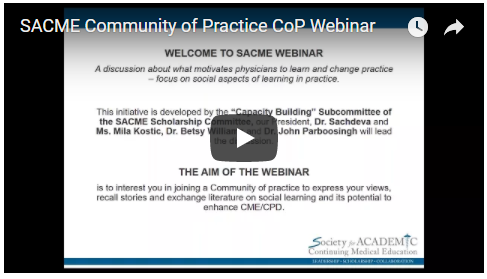Community of Practice (CoP)
SACME COP for Using Social Learning Principles in CPD/CME
The first SACME Community of Practice (CoP) Webinar: A discussion about what motivates physicians to learn and change practice – focus on social aspects of learning in practice took place on January 31, 2018. You can watch the video below.
Discussion details:
"Most relevant learning activities were directly related to patient care rather than motivated by competence improvement goals" (van de Wiel et al 2011)
How can CPD/CME be transformed to help in developing competent healthcare professionals in the 21st Century?
Come engage with colleagues and share your perceptions of how physicians learn in practice!
This initiative is developed by the “Capacity Building” Subcommittee of the SACME Scholarship Committee. Our President, Dr. Sachdeva and Ms. Mila Kostic, Dr. Betsy Williams and Dr. John Parboosingh will lead the discussion based on the theoretical concepts
- Physicians rated immediate patient care needs, personal awareness (self-assessment), and new practice updates as the most important means of identifying learning gaps, while objective tests of knowledge or skills were rated as the second-to least important. (Cook et al 2017)
- "The gap between vision and current reality is a source of energy that creates engagement, emotional reactions and affordances for change. We call this gap creative tension".
- "Understanding how to effectively curate learning may have significant ramifications for improving classroom pedagogy."
- “Social Learning Spaces - social containers that facilitate genuine interactions among participants, who can bring to the learning table both their experience of practice and their experience of themselves in that practice”.
- "Physicians’ learning is largely guided by practical experience rather than deliberately sought. How can future CME be woven into the fabric of practice? (van de Wiel et al 2011)
Selected Literature in support of the discussion topic:
Van de Wel MWJ, den Bossche PV et al. Exploring deliberate practice in medicine: how do physicians learn in the workplace? Adv in Health Sci Educ. 2011: 16;81-95.
Wenger E. Four essays on innovation and learning in social systems. Social learning capability. 2009: p3. Available for Download.
Social Learning Spaces are described by Wenger as” social containers that enable genuine interactions among participants who can bring to the learning table both their experience of practice and their experience of themselves in that practice” The latter differentiates a physician recalling an incident in her practice (ie., praxis) from the traditional case report presented at grand rounds.
Wenger-Trayner E. et al, Learning in Landscapes of Practice: Boundaries, identity, and knowledgeability in practice-based learning (2014). Abingdon: Routledge.
Focus on landscapes of practice, rather than single communities or networks as a key locus of social learning capability, this book introduces the concept of knowledgeability as an outcome of learning with respect to a landscape, which includes a lot of practices in which one cannot claim competence. Theoretically knowledgeability is a landscape-level counterpart to the concept of competence, which is defined at the level of communities of practice. Knowledge brokers are identified as systems conveners. These are people who work at the landscape level to enable new forms of social learning capability. The Authors discuss key dimensions of the role: its challenges, the traits of people who do this, and what a social learning approach looks like.
Kelly D. Curation: A Core Competency for Learning Professionals From the Learning Circuits Blog
There are multiple layers to curation, each of which has benefits when applied to learning and performance:
Aggregation: Gathering and sharing relevant content. It releases the individual worker from needing to seek out the content.
Filtering: Instead of simply aggregating content, filtering shares only those resources that are most relevant and valuable.
Elevation: Recognizing a larger trend in the sea of seemingly less important content.
Mashups: Merging two or more unrelated pieces of content to form a new message.
Timelines: Organizing random pieces of content in chronological order to show the evolution of an idea.
Senge PM. The Fifth Discipline: The Art and Practice of the Learning Organization. New York, NY: Doubleday; 1990: 9, 142, 152.
According to Senge, well-facilitated interactive sessions build a creative tension between current practice and a shared vision of a better practice that fosters genuine commitment among practitioners rather than compliance.
Cook D et al. Professional Development Perceptions and Practices Among U.S.
Physicians: A Cross-Specialty National Survey
Academic Medicine. Volume 92(9) pgs. 1335 September 2017
ISSN: 1040-2446
The results suggest that physicians value peer discussions when participating in an activity. Physicians are interested in using creative spaces where they are in charge (eg.,monthly conference calls, online discussions) to exchange cases. (Exchange live experiences instead of reified case reports as presented at grand rounds). Also, physicians would like credit for what they are already doing (i.e., workplace learning). Stating these barriers in positive terms, physicians desire time-efficient, low-cost, practice-relevant learning on topics of their choosing. Physicians generally did not want external help identifying their learning needs, preferring instead to rely on point-of-care questions, personal awareness, and practice updates.
Abbey. N 2009. Developing 21st Century Teaching and Learning: Dialogic Literacy
We stand on the threshold of a pedagogical and technological revolution, with profound and far-reaching consequences for education ... In the years ahead, this revolution is likely to coalesce around emerging pedagogies such as 'structured dialogue.'

